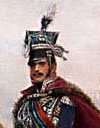 |
| Battle of Smolensk |
Thus Napoleon's third attempt to trap the Russians into a decisive battle ended in as resounding a failure as its predecessors. In view of the unfavorable outcome of the Maneuver of Smolensk, Clausewitz and other commentators have asserted that Napoleon would have been wiser to make a straightforward advance from Vitebsk instead fo the brilliantly conceived but poorly executed strategic envelopment. Some argue that he should have undertaken a tactical envelopment of the Russian right; others that heshould have waited longer at Vitebsk, letting the enemy come to him. However, it i more important to summarize the reasons for his failure in the course he chose than to speculate about alternative courses of action.
 |
| Napoleon |
A combination of factors deprived Napoleon of the great battle he so ardently desired. First, Bagration's prompt reaction in sending his VIIth Corps to garrison the city ensured that an adequate force was present to face Murat and Ney. Secondly, the old-fashioned fortifications of Smolensk proved stronger than they appeared, and this enabled Raevski to hold off the French until help could arrive. Thirdly, the French sacrificed all chance of surprising the enemy by their inexplicable waste of August 15, which was spent in operational idleness. Fourthly, Napoleon was undoubtedly guilty of failing to press his advantage to the full. He delayed the final advance on Smolensk, then indulged in useless and piecemeal assaults on the city instead of pressing on to cut the Moscow road, selecting the wrong commander for this task when he at last ordered it, and, throughout, displayed a general lack of the energy and drive which might have inspired his subordinates to success, heedless of all difficulties. This is a heavy indictment of Napoleon as a general, but politically there ma have been some justification for his decision to concentrate the army's efforts against Smolensk, militarily only a secondary objective. Perhaps he hoped a resoundingly successful storm of one of the most important and venerated cities of Holy Russia would suffice to bring the Tsar to terms.
If this is what he thought, he was of course totally mistaken. The determination of Alexander and the Russian people to withstand the invader was rapidly attaining a near-mystical pitch; Napoleon was to learn that the will of the Russians was as unbreakable as that of the Spanish populace.
~D. Chandler, The Campaigns of Napoleon, p. 789-790

























































No comments:
Post a Comment